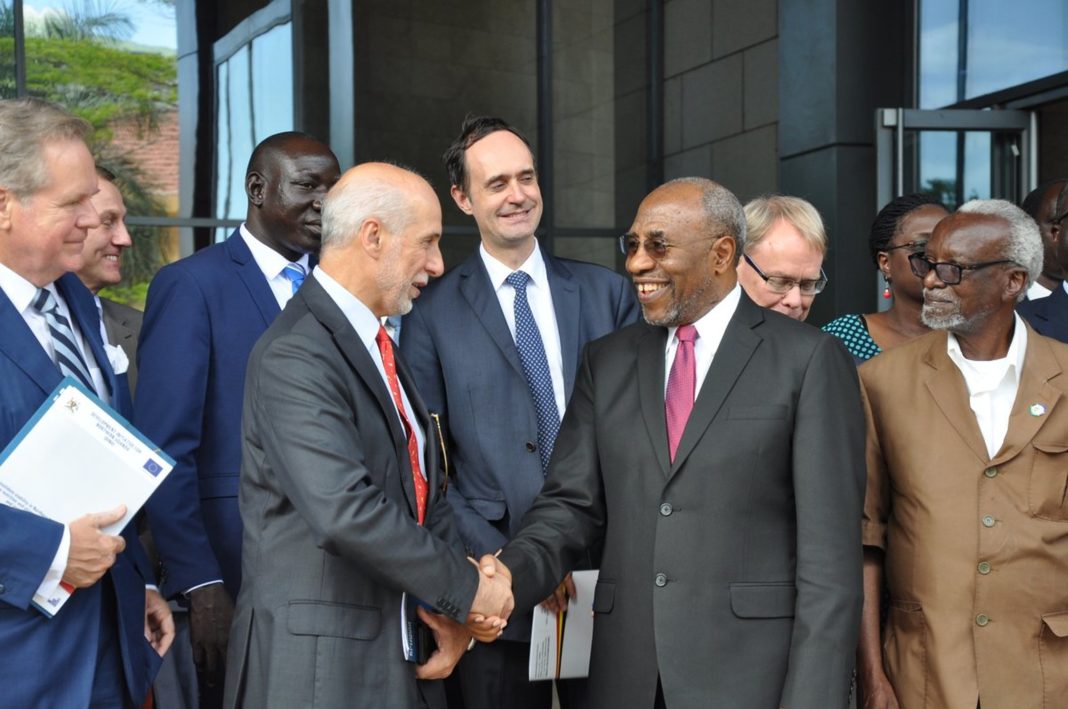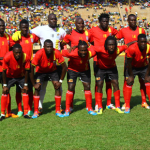The Uganda government in conjunction with development partners has launched a four-year Shs 668.5b project that aims at reducing poverty, under-nutrition and to propel inclusive socio-economic development in northern Uganda.
The project dubbed ‘Development Initiative for Northern Uganda’ (DINU) was launched in Kampala on Friday by the Prime Minister, Dr. Ruhakana Rugunda in the presence of representatives of the European Union (EU), DFID, GIZ, UNICEF and TradeMark East Africa and the local government leaders from the districts were the project will be implemented.
Launching the project, Dr Rugunda said it was a continuation of an earlier project to fight poverty and boost social economic development in Northern Uganda, and he also thanked the development partners for injecting funds in the project.
The EU is the largest funder of the project through its 11th European Development Fund which has provided Euro.132.8m. Government of Uganda has provided Euro.12m, while UNCDF and UNICEF have provided Euro.04m and Euro1.1m, respectively. Germany’s GIZ has contributed Euro1.8 while UK’s DFID has sunk in Euro2.7m.
The programme that succeeds previous two projects, the Northern Uganda Agricultural Livelihoods Recovery Programme (ALREP) and Karamoja Livelihoods Programme (KALIP), has three components namely: transport infrastructure, food security and agriculture and good governance.
The project aims to improve food security, improve maternal and child nutrition, enhance household incomes. It also aims to increase trade locally, regionally and internationally. Further it will also strengthen good governance and the rule of law of local governments and empower communities, said Gonzaga Mayanja, the Focal Coordinator of the project in the Office of the Prime Minister.
Much as it targets 33 districts of the north of the country, the project will mainly be implemented in the 16 districts of Amudat, Moroto, Abim, Pader, Agago, Lamwo, Omoro, Amuria and Otuke. Others are Alebtong, Oyam, Kole, Adjumani, Moyo, Yumbe and Zombo.
“The remaining 17 districts will be treated as satellites in which some components may be executed,” said Mayanja.
EDF’s Euro57.8m is to help increase production of diversified food items, increase market accessibility and improve nutrition in the region. Among others, officials will use the money to create linkages between farmers, processors and market operators, they will also provide seed capital to start-ups, rural electrification and product lines.
The money will also be used to build to set up water infrastructure in the Karamoja region, land registration, vocational training.
Euro65m will be used to rehabilitate and upgrade to bituminous standard of the Atiak-Adjuman-Moyo-South Sudan border road. Targeted also is the 65.8km Atiak-Larop road. There will also be the construction of a logistical hub (inland container depot) in Gulu to facilitate trade.
More Euro10m, among others, will be used to promote good governance in the region where capacities of local governments will be strengthened. The project here will also enhance accountability and transparency in local governments which are important for effective service delivery.
Still, UNCDF’s Euro 25.85, among other will go to seed capital to incubation projects, rehabilitate community access roads and strengthen capacities of local governments.
GIZ’s Euro3.8m, among other activities, will help increase the number of households and businesses having access to electricity in 15 villages in Lamwo and Kabong districts.
GIZ has also set aside Euro5m to among others, construct 15 multipurpose valley tanks in Amudat, Kabong, Kotido and Moroto. The facilities will provide seasonal water for crop irrigation and livestock production.
Government will provide Euro5.1m to support vocational training institutes where disadvantaged youth will be provided with skills for employment, but also the money will help strengthen the capacities of police and other institutions in the law and justice sector.
The projects targets to benefit over seven million people, including civil society organisations and small and medium sized businesses.
The EU Ambassador to Uganda Attilio Pacifici, while commenting on the undertaking called for hard work, saying the project will help reduce poverty in the region considered to be the poorest in the country.
State Minister for Northern Uganda, Grace Kwiyucwiny, while addressing participants at the launch of the project called for a coordinated and combined effort, saying the project is one of those aimed at bringing the northern region closer to the rest of other regions in terms of social economic development.








